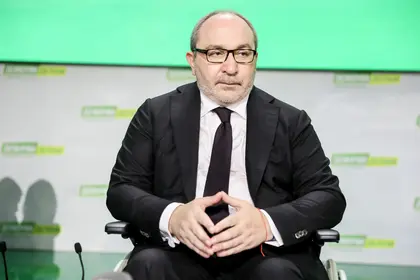The online asset declaration of former Kharkiv Mayor Hennadiy Kernes listed a rented flat, several expensive watches and $2.5 million in cash.
It was always seen as too little for a man often labeled the city’s “godfather.”
JOIN US ON TELEGRAM
Follow our coverage of the war on the @Kyivpost_official.
Three months after Kernes died from COVID-19 complications on Dec. 17, his vast riches began surfacing in the pockets of his common-law wife Oksana Gaisinskaya and her son Rodion Gaisinskyi.
- Check the most recent war in ukraine update in the Kyiv Post's daily news stories released today.
- Find the newest Ukraine news pieces that came out today.
According to journalists from Bihus.info, a Ukrainian investigative media outlet, the Kernes’ family’s property includes several large city markets, a brick factory, lucrative restaurants, coffee shops and vast plots of land in downtown Kharkiv.
A prominent supporter of the pro-Kremlin Party of Regions, Kernes became mayor of Kharkiv in 2010, previously serving four years as the head of the city council.
Kernes’ 10-year reign in Kharkiv was marked by scandals and controversy.
During his reign, journalists often spotted Kernes using expensive cars that he didn’t put on his declaration, while anti-corruption activists said that it is impossible to do business in Kharkiv without Kernes’ approval.
In 2014, Kernes was shot while taking his usual morning jog. He never fully recovered and had to use a wheelchair ever since. In 2016, Kernes’ former business partner Yuriy Diment was shot dead in a Kharkiv cemetery. Both cases remain unsolved.
Kernes’ actual riches were hidden among shell owners. Furthermore, Kernes didn’t declare Gaisinskaya’s possessions in his asset declaration since they weren’t officially married.
After Kernes contracted COVID-19 and was hospitalized in Berlin, his shell possessions began appearing in the hands of Gaisinskaya and her son. When he died, the process accelerated.
On March 29, journalists from Bihus.info published a video from Kharkiv tracking the “newly acquired” possessions of Gaisinskaya and her son.
Among the family’s possessions are land plots on which Kharkiv’s largest markets – Central, Europe, Fairy Tale, Horse, KhTZ, Industrial, Solly and Terminal – are situated.
According to Bihus.info, the land owned by the city was either leased to shell companies or sold by the city in several installments to low-profile firms. Bihus.info writes that Solly market and Terminal market were expropriated from previous owners using Kharkiv’s utility services that blocked the premises citing leaking pipes.
Bihus.info reported that besides the markets Gaisinskyi recently became the official owner of Parking+, a company that receives procurement orders to repair Kharkiv’s roads. The company owns a factory that produces bricks and asphalt.
Additionally, Gaisinskaya was recently registered as the owner of the land under several coffee shops and restaurants in downtown Kharkiv. According to Bihus.info land under several historical buildings in the city center was bought by companies now owned by Gaisinskaya for the construction of new shopping malls.
Journalists from Bihus.info allege that all this land is worth billions. Most of it, Kernes’ family received from the city run by Kernes.
During his reign, Kernes was investigated in a major corruption case involving the distribution of land in Kharkiv Oblast. However, after pre-trial investigations concluded, he faced no charges for the alleged theft of $984 million from the allocation of state land to people close to the mayor.
On March 30, parliament is expected to declare that the snap mayoral elections in Kharkiv will take place on Oct. 31, over a year after Kernes’ death.
Until then, Kernes’ ally Ihor Terekhov will continue to lead the city as the acting head.
Editor’s Note: This report is part of the Investigative Hub project, within which the Kyiv Post monitors investigative reports in the Ukrainian media and brings them to the English-speaking audience, as well as produces original investigative stories. The project is supported by the National Endowment for Democracy.
You can also highlight the text and press Ctrl + Enter




